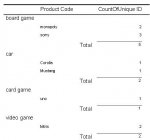Dragenesis
Registered User.
- Local time
- Yesterday, 22:39
- Joined
- Dec 18, 2007
- Messages
- 16
Here's my problem. I need to generate a report that says how much of each individual product was produced and as well as the total produced for a specified category in a time period. Something like the following:
05 Catagory A: 02 Product AA, 01 Product AB, 02 Product AC
10 Category B: 07 Product BA, 03 Product BB
04 Category C: 01 Product CA, 01 Product CB, 01 Product CC, 01 Product CD
etc...
I currently have a query that queries a database and pulls out all products that were produced in a specified period and the categories they belong to and dump them into a local access table. Now what I need to do is search through the query results and count up how many of each product were produced (02 AA, 01 AB, etc...) and the totals for each category. The number of categories is pretty limited (6), but there are hundreds of product codes, so I need a way to do this without having to type in each induvidual product code as the requirement by which the query searches. Also, the product codes that get returned are different every day.
I was thinking something along the lines of take the product code of the first row and check for any others in the results that match and write that into another table. Then move onto row 2 and use its product code as a search parameter and search through the query results for any matches. Then continue that until the end of the query results. Can I do that? Is there a better way to achieve what I need?
05 Catagory A: 02 Product AA, 01 Product AB, 02 Product AC
10 Category B: 07 Product BA, 03 Product BB
04 Category C: 01 Product CA, 01 Product CB, 01 Product CC, 01 Product CD
etc...
I currently have a query that queries a database and pulls out all products that were produced in a specified period and the categories they belong to and dump them into a local access table. Now what I need to do is search through the query results and count up how many of each product were produced (02 AA, 01 AB, etc...) and the totals for each category. The number of categories is pretty limited (6), but there are hundreds of product codes, so I need a way to do this without having to type in each induvidual product code as the requirement by which the query searches. Also, the product codes that get returned are different every day.
I was thinking something along the lines of take the product code of the first row and check for any others in the results that match and write that into another table. Then move onto row 2 and use its product code as a search parameter and search through the query results for any matches. Then continue that until the end of the query results. Can I do that? Is there a better way to achieve what I need?

